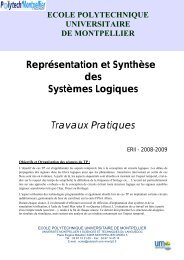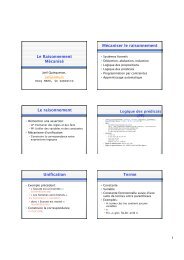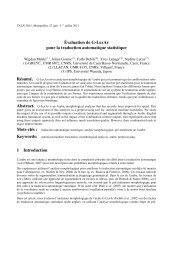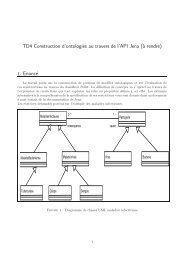Evaluating User Experience in Games: Concepts and Methods - Lirmm
Evaluating User Experience in Games: Concepts and Methods - Lirmm
Evaluating User Experience in Games: Concepts and Methods - Lirmm
Create successful ePaper yourself
Turn your PDF publications into a flip-book with our unique Google optimized e-Paper software.
124 G. McAllister <strong>and</strong> G.R. White<br />
analysis, mean responses were also presented back to the development team <strong>in</strong> bar<br />
graph form, whose value axis ranged from 1.00 to 4.00.<br />
Focus group test<strong>in</strong>g <strong>in</strong> the games <strong>in</strong>dustry is generally approached with a degree<br />
of trepidation. Most developers are sceptical about the quality of the processes, participants,<br />
their feedback <strong>and</strong> <strong>in</strong>terpretation of data. Subsequently, it can be hard to<br />
get buy-<strong>in</strong> from the development team, <strong>and</strong> most importantly from the senior members<br />
who have the authority to make decisions relat<strong>in</strong>g to them. Field’s answer is to<br />
prove the quality of these issues to the major stakeholders <strong>in</strong> the team. For example,<br />
dur<strong>in</strong>g their recent test<strong>in</strong>g sessions the lead programmer <strong>and</strong> artist were actively<br />
<strong>in</strong>volved, visited the test<strong>in</strong>g site <strong>and</strong> gave their feedback about the research questions<br />
the study was <strong>in</strong>tended to address.<br />
Field praised the work of the focus group company <strong>and</strong>, despite comment<strong>in</strong>g that<br />
it was an expensive process, would consider doubl<strong>in</strong>g the number of participants for<br />
their next game. In particular, he po<strong>in</strong>ted out that all of the participants were already<br />
aware of Buzz!, so an additional control group who had never played before would<br />
be beneficial.<br />
The identification of demographic groups does guide the development process,<br />
<strong>and</strong> Field po<strong>in</strong>ts out the importance of underst<strong>and</strong><strong>in</strong>g the context <strong>and</strong> manner <strong>in</strong><br />
which the game will likely be played. Throughout the development life cycle, the<br />
team try to bear <strong>in</strong> m<strong>in</strong>d what Field calls “the mum-factor”; an <strong>in</strong>formal personabased<br />
approach where they try to imag<strong>in</strong>e their own mothers hold<strong>in</strong>g the controllers<br />
<strong>and</strong> enjoy<strong>in</strong>g play<strong>in</strong>g the game. Similarly, they have a “drunk factor” scenario, for<br />
groups of gamers who come home to play after a dr<strong>in</strong>k<strong>in</strong>g session at the pub. Similar<br />
to Zoë Mode, it is acknowledged that the Relentless development team do not represent<br />
the typical consumer <strong>and</strong> that features which <strong>in</strong>dividual developers might enjoy<br />
are not necessarily appropriate to <strong>in</strong>clude <strong>in</strong> the f<strong>in</strong>al game.<br />
This attention to players permeates the whole design process to the extent that<br />
the designers try to use a more conversational language when address<strong>in</strong>g players,<br />
such as avoid<strong>in</strong>g conventional game terms like “Load<strong>in</strong>g”. This term<strong>in</strong>ology could<br />
potentially alienate players for whom Buzz! might be their first video game experience,<br />
so the team prefer to speak to the players <strong>in</strong>formally with phrases like “How<br />
would you like to play this game?” <strong>in</strong>stead of the terse but typical “Select Mode”.<br />
7.4.3.3 Post-Launch<br />
Not unlike the technique of <strong>in</strong>strumentation discussed earlier <strong>in</strong> the Black Rock<br />
case study, Buzz! Quiz TV captures data which allow the team to identify what, how<br />
<strong>and</strong> when the game is played. However, rather than be<strong>in</strong>g captured <strong>and</strong> used only<br />
<strong>in</strong>ternally with pre-release versions of the game, Relentless capture telemetry data<br />
remotely from players of the f<strong>in</strong>al, released game as they play <strong>in</strong> their own homes.<br />
Sony’s legal department underst<strong>and</strong>ably limits what k<strong>in</strong>d of data can be collected,<br />
but clearly this still cont<strong>in</strong>ually produces a vast quantity of data, <strong>and</strong> Field comments<br />
that this does make it difficult to filter <strong>and</strong> analyse.<br />
Relentless also analysed the 50 or so reviews available after the game shipped<br />
<strong>in</strong> an attempt to identify problematic issues <strong>and</strong> <strong>in</strong>corporate this feedback <strong>in</strong>to<br />
future developments. This process <strong>in</strong>volved a frequency analysis of comments about

















